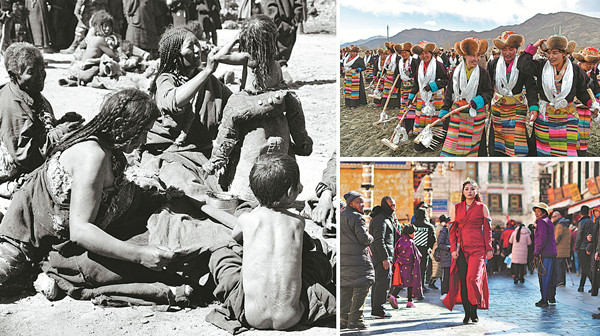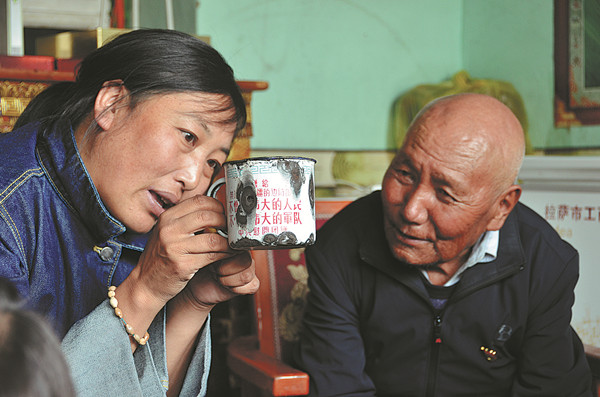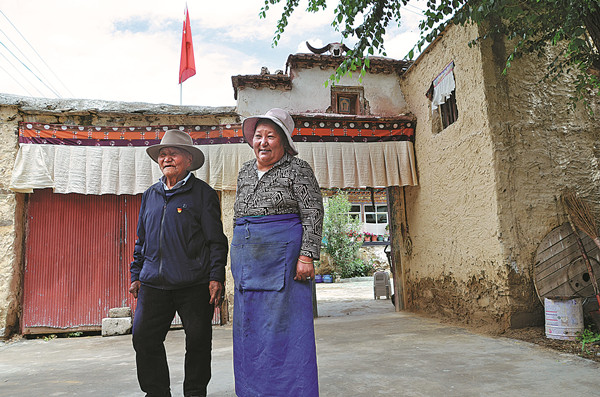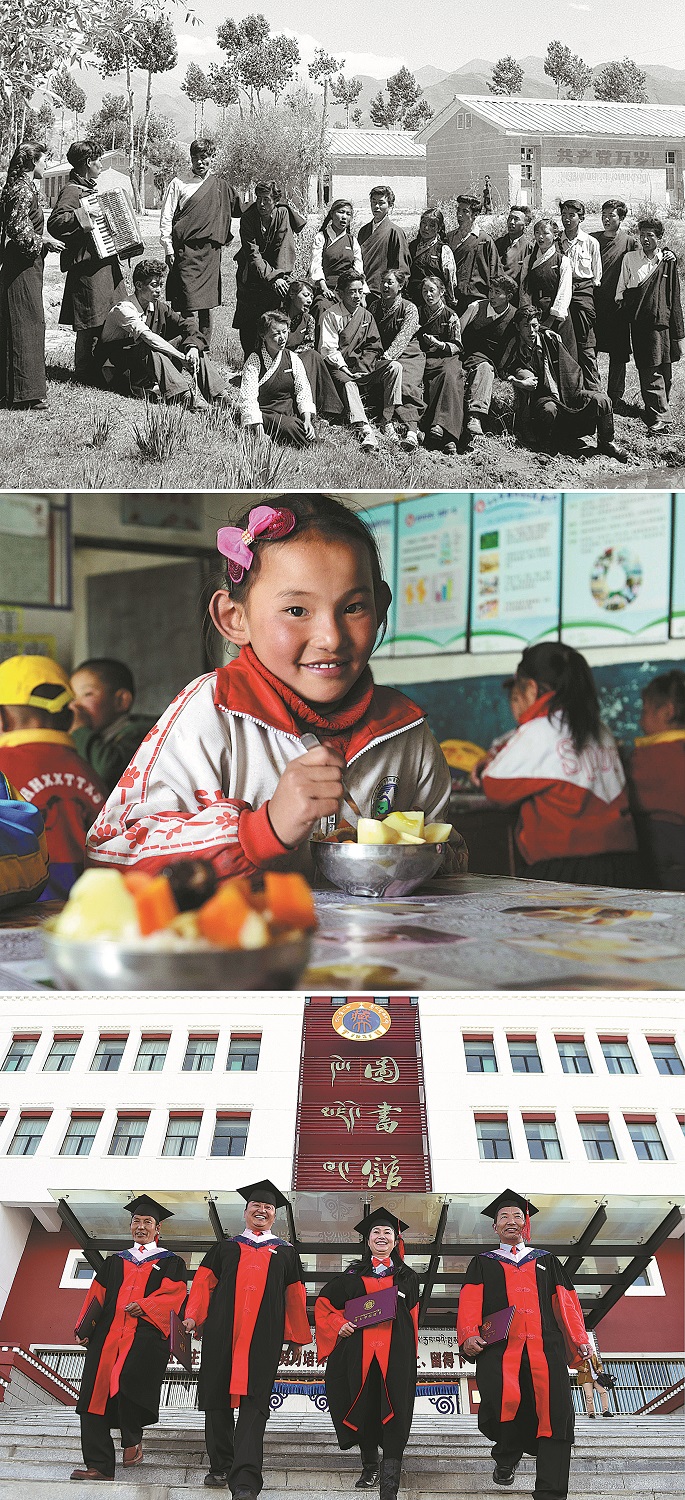From serfdom to security
Updated: 2022-12-26 By Zhang Yangfei (China Daily)  Print
Print 



Clockwise from left: Mothers and children beg for food in feudal Tibet. Women wear traditional dress to a spring plowing ceremony in March 2019. A Tibetan fashion model walks on Barkhor Street in Lhasa, capital of the Tibet autonomous region, in January 2019. XINHUA
Samten, 81, remembers the first time he ate yak meat. He was 25, and he found the juice that burst into his mouth delicious. However, he had never eaten meat before, so his body could not absorb the protein and he got diarrhea.
His lowly status as a serf in a village near downtown Lhasa disbarred him from eating meat.
He said the People's Liberation Army freed Tibet from the aristocracy, meaning he was able to cultivate his own land and butcher his own livestock.
He noted that he was just one of the large number of serfs that accounted for more than 90 percent of Tibet's population at that time.
Samten, who like many Tibetans only uses one name, was born into a family of serfs. He had three older brothers. His oldest brother was beaten by his owner and lost the use of his legs. Because serfs were not allowed access to doctors, the wounds on his injured lower body quickly became septic and filled with maggots. He died a few days later.
Seeing the misery of their oldest sibling, Samten's other brothers were frightened, so they ran away. They were never heard from again.
As the only child left, Samten said he was also scared, and he thought about running away. However, his parents and grandparents were in the hands of the serf masters, and he knew they would be severely punished. He also knew that he would be beaten to death if he were caught.

A Tibetan-Mandarin interpreter examines a cup given to Samten (right) by a PLA soldier in the 1950s. GAO JINLIANG/FOR CHINA DAILY
Lack of choice
"We didn't have a choice. If you were born a serf, you stayed a serf for your entire life. We were resigned to our fate," he said.
He continued working for his masters. He toiled 10 hours a day, plowing the fields and herding yaks. But if his masters were unhappy, they would beat him with whatever was within reach, he said.
His food allowance every day was six teaspoons of tsampa, a staple Tibetan food made from roasted barley flour. Today, tsampa is often mixed with yak butter and milk, but at that time Samten only had water.
Gaga, an elderly woman in Nyingchi city, has even worse memories. When she was 7, the local serf masters wanted more laborers, so they tied her onto the back of a horse and carried her to the pastures to tend yaks.
The 81-year-old said that in addition to being beaten, female serfs in feudal Tibet endured terrible treatment. They were not allowed to enter a house, and they were prohibited from raising their heads when they met men. At night when she slept on the grassland, Gaga used her shoes as a pillow and counted stars, wishing the days and years would go by faster.
"We were treated worse than animals. Yaks could eat grass and enjoy the sun's warmth. Dogs could go inside. We just had to work, day and night," she said.

Samten and his daughter stand in front of their house in Dagze county, Lhasa, Tibet, last month. GAO JINLIANG/FOR CHINA DAILY
Dark memories
One time, when she needed to return the yaks to the shed, she counted them and found she had lost one. She dared not go back, so she slept on the mountain. It was a cold winter, and she said she felt so desperate that there was a moment when she thought she would just lie there and freeze to death. The next day, she set out to look for the missing yak. Luckily for her, she found it.
"The old Tibet was dark," Samten said. Those dark memories cast such a deep shadow on his heart that even after the democratic reform, when serfs were given equal status with their erstwhile masters, he deliberately avoided meeting any of his former overlords.
"At the start of the reform, I worried all the time that the feudal system would rise again," he said.
The dark time didn't last too long, though. In 1951, the PLA liberated Tibet peacefully, and in 1959, the central government carried out a profound reform, overthrowing the feudal system and freeing the serfs and slaves in the region.
Samten was given 0.67 hectares of land in 1959, and in 1965, he was elected head of his village's production cooperative. Gaga was given a job on a farm in 1964, the year she was registered as a citizen.
"I felt I had come back to life when I had my own land," Samten said. "The older generation of the Communist Party of China had to endure so much hardship to create a better life for us. I am really grateful to them, especially those who sacrificed their lives."
However, the PLA wasn't welcomed by the local people initially because the aristocrats and serf owners regarded the soldiers as a threat to their own interests.
Gaga said her masters told her family that when they entered Tibet, the soldiers would eat their children. Her mother, who gave birth to 11 children, believed their claims and became excessively worried and miserable.
To avoid the PLA, Gaga's family, who lived in Chamdo city, fled south toward the border with India. By the time they arrived in Metog county, the army had reached Chamdo. Her relatives who had stayed in the city sent a message saying that the soldiers were extremely polite and had offered the local people food and jobs.

From top: Students prepare for their graduation ceremony at Lhasa Middle School in Tibet. A girl enjoys a free meal provided by her school in Shuanghu county, Tibet, in 2014. Four students receive their doctorates from Tibet University in 2017. XINHUA
Medical assistance
As a result, Gaga's family abandoned the idea of crossing the border and started their journey home. On their way north, Gaga's oldest son had an epileptic seizure. Just when everyone said the child was going to die, a PLA doctor treated him and brought the episode to an end. That was when Gaga completely changed her opinion of the troops.
Samten recalled his brief encounter with the PLA. The serf masters had long scared people with tales that the soldiers would "burn, kill and loot" when they entered the villages.
However, when they arrived, the troops avoided the houses and, instead of plundering, they shared their food with the residents.
"I watched from afar as they marched around carrying heavy backpacks. They didn't look like the kind of bad people who ate children. Seeing them share their rice with us, I began to have the feeling that maybe these people were here to save us," Samten said.
That first encounter left a deep impression on him. Later, during a skirmish, he volunteered to help transport supplies for the PLA. In return, a soldier gave him some towels and a cup that he still has.
"I never had a full stomach when I was a serf. My oldest brother lost his life after a beating. Today, 70 years after liberation, the people's lives have seen drastic changes, and my life has become better every day," he said.
"I pray with my whole heart that this happy life will last forever."
Wang Luxi contributed to this story.








